Hemato Oncology Testing Market
Hemato Oncology Testing Market Size and Share Forecast Outlook 2025 to 2035
Hemato oncology testing market is projected to grow from USD 4.0 billion in 2025 to USD 13.9 billion by 2035, at a CAGR of 13.1%. Lymphoma will dominate with a 47.0% market share, while services will lead the product segment with a 58.7% share.
Hemato Oncology Testing Market Forecast and Outlook 2025 to 2035
The global hemato oncology testing market is set to grow from USD 4.03 billion in 2025 to USD 13.85 billion by 2035, adding USD 9.82 billion in new revenue and advancing at a CAGR of 13.1%. Growth is driven by escalating demand for precision oncology diagnostics validation, expanding hematological cancer surveillance infrastructure across regulated healthcare markets, and accelerating molecular diagnostic requirements among oncology and pathology organizations seeking accurate disease characterization solutions.
Hemato oncology testing technologies are increasingly recognized as essential tools for cancer diagnostic practitioners, offering precise molecular detection capabilities, therapeutic monitoring assurance, and comprehensive disease profiling characteristics compared to traditional morphological assessment approaches.
Quick Stats for Hemato Oncology Testing Market
- Hemato Oncology Testing Market Value (2025): USD 4.03 billion
- Hemato Oncology Testing Market Forecast Value (2035): USD 13.85 billion
- Hemato Oncology Testing Market Forecast CAGR: 13.1%
- Leading Cancer Type in Hemato Oncology Testing Market: Lymphoma (47.0%)
- Key Growth Regions in Hemato Oncology Testing Market: North America, Europe, and Asia Pacific
- Top Players in Hemato Oncology Testing Market: Roche, Abbott, Thermo Fisher, Illumina, Bio-Rad
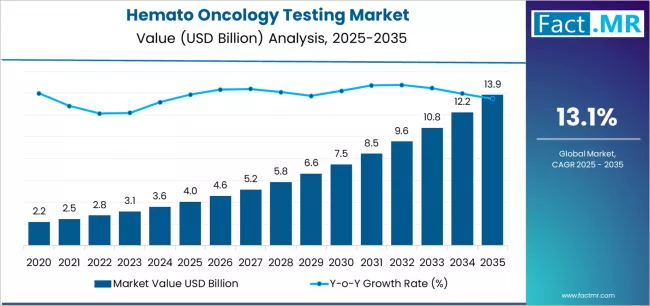
PCR-based testing formulations dominate the market, favored in oncology and diagnostic environments for their established validation properties, providing sensitive mutation detection mechanisms, rapid turnaround capabilities, and clinical acceptance across diverse hematological malignancy applications and patient demographics.
Services remain fundamental in diagnostic testing protocols where routine disease monitoring and treatment response assessment match clinical requirements and oncology care confidence standards. Hospitals are advancing among end-use categories as specialized cancer treatment facility networks expand and molecular diagnostic infrastructure increases accessibility in patient-convenient locations with comprehensive care structures.
Geographic concentration demonstrates dynamic growth patterns with India and USA leading expansion, supported by rising cancer diagnostic capacity, precision medicine consciousness expansion among oncology populations, and molecular testing laboratory establishment programs in cancer centers.
USA, Germany, UK, China, Japan, Brazil, and India demonstrate robust development through established oncology care ecosystems, regulatory framework maturity for diagnostic products, and standardized acceptance of molecular profiling procedures. Competitive advantage is consolidating around detection sensitivity profiles, clinical utility documentation, laboratory automation compatibility, and integrated diagnostic testing portfolios rather than standalone assay formulations alone.
The first half of the decade will witness the market climbing from USD 4.03 billion to approximately USD 7.44 billion, adding USD 3.41 billion in value, which constitutes 35% of the total forecast growth period. This phase will be characterized by the continued dominance of PCR methodologies in hematological malignancy testing settings, combined with accelerating adoption of next-generation sequencing technologies in comprehensive cancer profiling applications where clinical validation and multiplex testing create favorable diagnostic outcomes.
The latter half will witness sustained expansion from USD 7.44 billion to USD 13.85 billion, representing an addition of USD 6.41 billion or 65% of the decade's growth, defined by broadening acceptance of liquid biopsy protocols and integration of automated molecular diagnostic platforms across mainstream oncology treatment facilities.
Where revenue comes from - Now Vs Next (industry-level view)
| Period | Primary Revenue Buckets | Share | Notes |
|---|---|---|---|
| Today | Lymphoma Testing | 47.0% | Diagnostic dominance |
| Services | 58.7% | Primary product category | |
| Hospitals | 75.3% | Leading user segment | |
| PCR Technologies | 30.2% | Molecular detection | |
| Leukemia Testing | 32.1% | Secondary cancer focus | |
| Future (3-5 yrs) | NGS Comprehensive Profiling | 42-48% | Precision medicine advancement |
| Liquid Biopsy Testing | 35-41% | Minimally invasive monitoring | |
| Digital PCR Applications | 28-34% | Enhanced sensitivity | |
| AI-Powered Diagnostics | 25-31% | Data interpretation | |
| MRD Detection Services | 38-44% | Treatment monitoring | |
| Companion Diagnostics | 32-38% | Targeted therapy selection | |
| Point-of-Care Testing | 18-24% | Decentralized diagnostics |
Hemato Oncology Testing Market Key Takeaways
At-a-Glance Metrics
| Metric | Value |
|---|---|
| Market Value (2025) → | USD 4.03 billion |
| Market Forecast (2035) ↑ | USD 13.85 billion |
| Growth Rate ★ | 13.1% CAGR |
| Leading Cancer Type → | Lymphoma |
| Primary Product → | Services |
The market demonstrates exceptional fundamentals with Lymphoma capturing a commanding 47.0% share through superior clinical prevalence characteristics, established diagnostic advantages, and proven detection profiles across oncology testing applications. Services drive primary product demand at 58.7% share, supported by established diagnostic infrastructure and comprehensive testing requirements that maintain clinical excellence across diverse oncology segments.
Geographic concentration remains anchored in North America and Europe with established market leadership through cancer diagnostic capacity and molecular testing laboratory infrastructure development, while emerging markets show accelerated adoption rates driven by precision medicine demographics and clinical validation procedure preferences.
Imperatives for Stakeholders in Hemato Oncology Testing Market
Design for precision and clinical utility, not just mutation detection
- Offer complete diagnostic assurance solutions: advanced testing technologies + laboratory automation integration + clinical decision support + result interpretation systems + treatment monitoring platforms.
- Preconfigured testing packages: lymphoma profiling specifications, leukemia monitoring configurations, MRD detection programs, and combination diagnostic protocols for diverse oncology requirements.
Clinical validation readiness for oncology applications
- Comprehensive analytical validation documentation, clinical utility evidence systems, and diagnostic infrastructure (sample traceability, quality assurance, result reporting protocols).
Affordability-by-design approach
- Cost-optimized testing portfolios, flexible diagnostic pricing models, laboratory partnership programs, and transparent total testing cost documentation.
Clinical education-focused market penetration
- Established molecular diagnostic workshops + comprehensive certification programs (assay interpretation, clinical significance, quality management); direct oncologist engagement for relationship development and diagnostic confidence building.
Segmental Analysis
The market segments by cancer type into Lymphoma, Leukemia, Myeloproliferative Neoplasms (MPNs), and Other Cancers, representing the evolution from basic hematological malignancy detection toward sophisticated disease characterization with molecular capabilities, comprehensive profiling, and personalized treatment characteristics. The product segmentation divides the market into Services (58.7%) representing diagnostic testing delivery, and Assay Kits & Reagents for in-house laboratory applications, reflecting distinct operational models for molecular diagnostic implementation and clinical laboratory versus centralized testing service approaches.
The technology segmentation shows PCR's commanding 30.2% position with Real-time qPCR and digital PCR methodologies, followed by NGS, IHC, cytogenetics, and others, demonstrating varied detection objectives for mutation screening and disease monitoring versus comprehensive genomic profiling implementation and protein expression validation. The end-use segmentation shows hospitals' commanding 75.3% position, followed by Academic & Research Institutes and Others, demonstrating varied clinical specialization levels and diagnostic infrastructure concentrations.
What Makes Lymphoma Command the Largest Share in the Hemato Oncology Testing Market?
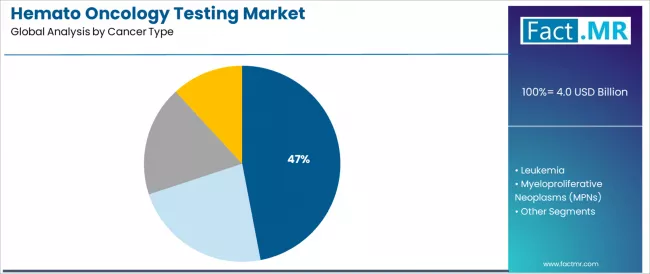
Lymphoma commands the leading position in the hemato oncology testing market with a 47.0% market share through superior clinical prevalence characteristics, including established diagnostic pathways, extensive treatment monitoring requirements, and diverse disease subtypes that enable laboratories to achieve comprehensive molecular profiling outcomes across varied patient populations and clinical presentation demographics.
The segment benefits from diagnostic complexity advantages through multiple disease entities, heterogeneous molecular alterations requiring comprehensive testing panels, and established clinical utility documentation demonstrating treatment guidance value. Advanced molecular technology enables subtype classification optimization, prognostic marker identification, and therapeutic target detection customization, where diagnostic precision and clinical actionability represent critical oncology care requirements.
Non-Hodgkin lymphoma testing holds significant share within the cancer type segment, appealing to oncologists seeking molecular characterization capabilities for precise disease classification. Lymphoma testing products differentiate through proven clinical utility profiles, treatment selection advantages, and integration with established oncology care protocols that enhance therapeutic decision-making while maintaining optimal patient outcomes for diverse lymphoma subtypes.
Key market characteristics:
- Advanced molecular properties with comprehensive biomarker panels and reproducible performance for disease classification
- Superior clinical validation documentation, enabling treatment protocol integration and regulatory approval readiness for therapeutic applications
- Comprehensive guideline acceptance, including NCCN recommendations and clinical practice inclusion for oncology standard-of-care applications
How Does Services Dominance Shape Product Preferences in Hemato Oncology Testing?
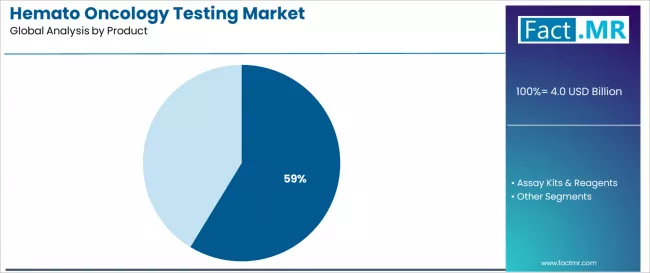
Services demonstrate product leadership in the hemato oncology testing market with a 58.7% share due to widespread complexity requirements and established focus on specialized laboratory expertise, comprehensive quality assurance, and technical interpretation that maximizes clinical utility while maintaining consistent diagnostic performance characteristics.
Healthcare providers prioritize service-based diagnostic delivery for complex molecular testing requirements, comprehensive result interpretation, and integration with established clinical workflows that enables coordinated oncology care experiences across multiple treatment protocols. The segment benefits from substantial clinical validation evidence and reimbursement pathway documentation that emphasizes centralized laboratory approaches for molecular profiling across diverse hematological malignancy demographics.
Reference laboratory testing captures significant share within the services segment, demonstrating provider preference for specialized diagnostic expertise. Precision oncology expansion incorporates molecular diagnostic services as essential clinical components for treatment selection programs, while targeted therapy development increases demand for companion diagnostic integration with pharmaceutical systems for comprehensive therapeutic decision-making outcomes.
What Drives Assay Kits & Reagents Adoption in Laboratory Testing Applications?
Assay Kits & Reagents capture substantial product share through comprehensive requirements in hospital laboratory operations, in-house testing capabilities, and rapid turnaround time optimization. These products demand sophisticated validation protocols capable of achieving clinical performance standards while providing consistent result reliability and laboratory workflow integration, appealing to pathology departments and molecular diagnostic teams seeking operational control advantages beyond send-out testing approaches.
What Makes PCR Command Technology Leadership in Hemato Oncology Testing?
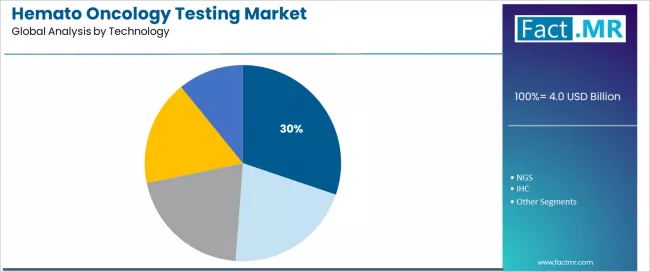
PCR establishes technology leadership in the hemato oncology testing sector with a 30.2% share due to comprehensive clinical validation and sustained focus on targeted mutation detection, quantitative monitoring applications, and minimal residual disease assessment that maximizes therapeutic monitoring while maintaining appropriate analytical sensitivity standards.
Laboratory directors and molecular pathologists prioritize PCR technologies for established clinical utility, rapid turnaround time capabilities, and integration with treatment monitoring requirements that enables coordinated therapeutic management experiences across multiple disease categories.
The sector benefits from substantial reimbursement infrastructure maturity and clinical guideline campaigns that emphasize PCR-based testing delivery for critical molecular diagnostic applications. Targeted therapy expansion incorporates PCR testing as standard monitoring protocols for treatment response assessment, while liquid biopsy development increases application breadth that meets sensitivity requirements and ensures molecular detection capabilities.
Technology dynamics include:
- Strong growth in digital PCR applications requiring enhanced sensitivity methods and absolute quantification capabilities
- Increasing adoption in real-time qPCR for rapid results and clinical decision support positioning
- Rising integration with automated platforms for high-throughput molecular diagnostic workflows
What Establishes Hospitals' Market Leadership in Hemato Oncology Testing?
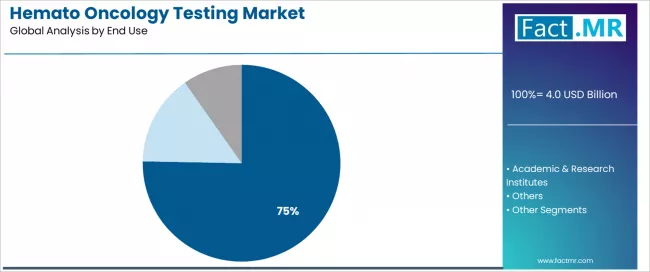
Hospitals establish market leadership in the hemato oncology testing sector with a 75.3% share due to comprehensive cancer care delivery requirements and sustained focus on diagnostic testing integration, treatment monitoring services, and patient management coordination that maximizes clinical outcomes while maintaining appropriate diagnostic quality standards.
Hospital administrators and oncology departments prioritize integrated diagnostic environments for coordinated cancer care, comprehensive testing accessibility, and integration with treatment delivery systems that enables streamlined patient experiences across multiple clinical touchpoints.
The sector benefits from substantial oncology care infrastructure and diagnostic reimbursement frameworks that emphasize hospital-based testing delivery for integrated cancer management applications. Cancer center expansion incorporates molecular diagnostic testing as standard clinical protocols for precision oncology, while hospital system consolidation increases diagnostic laboratory integration that meets complexity requirements and ensures comprehensive testing capabilities.
End-use dynamics include:
- Strong growth in academic medical centers requiring advanced testing methods and clinical trial support arrangements
- Increasing adoption in community hospitals for molecular diagnostic accessibility and standard-of-care positioning
- Rising integration with multidisciplinary tumor boards for comprehensive treatment planning and therapeutic decision support
What are the Drivers, Restraints, and Key Trends of the Hemato Oncology Testing Market?
| Category | Factor | Impact | Why It Matters |
|---|---|---|---|
| Driver | Rising hematological cancer incidence & aging population demographics (disease prevalence, patient population growth) | ★★★★★ | Increasing cancer cases enable diagnostic testing demand for disease detection and monitoring; growing patient populations drive molecular profiling adoption across oncology markets and diverse treatment segments. |
| Driver | Growth in targeted therapy development and personalized medicine approaches (precision oncology, companion diagnostics) | ★★★★★ | Drives demand for reliable molecular characterization systems and therapeutic selection protocols; laboratories providing actionable genomic information gain competitive advantage in oncology-focused diagnostic segments. |
| Driver | Regulatory approvals and reimbursement coverage expansion (Medicare policies, payer acceptance) | ★★★★☆ | Healthcare providers demand validated diagnostic methods and reimbursed testing services; regulatory framework visibility expanding addressable segments beyond traditional oncology demographics and academic research clientele. |
| Restraint | High testing costs & reimbursement limitations (pricing pressures, coverage restrictions) | ★★★★☆ | Cost-conscious healthcare systems face budget limitations and utilization constraints, restricting test adoption and affecting technology penetration in resource-limited healthcare organizations and emerging market hospitals. |
| Restraint | Technical complexity & interpretation challenges (bioinformatics requirements, clinical significance) | ★★★☆☆ | Laboratories face capability concerns and expertise limitations; increases implementation barriers and affects adoption penetration in smaller hospital facilities and community oncology practices. |
| Trend | Liquid biopsy adoption & minimally invasive testing technologies (ctDNA analysis, circulating biomarkers) | ★★★★★ | Growing clinical acceptance for non-invasive monitoring and serial testing approaches beyond traditional tissue-based validation; advanced methodologies become core differentiation strategy for progressive diagnostic positioning. |
| Trend | Laboratory automation & AI integration (robotic systems, machine learning interpretation) | ★★★★☆ | Molecular diagnostics evolving beyond manual processing toward automated testing workflows; technology positioning drives enhanced efficiency and result accuracy in sophisticated oncology diagnostic environments. |
Analysis of the Hemato Oncology Testing Market by Key Countries
The hemato oncology testing market demonstrates robust regional growth dynamics with emerging leaders including India (15.2% CAGR) and USA (14.7% CAGR) driving expansion through precision medicine programs and molecular diagnostic laboratory infrastructure development. Strong performers encompass China (14.1% CAGR) and UK (13.4% CAGR), benefiting from established oncology care infrastructure and targeted therapy adoption demographics. Developed markets feature Germany (12.9% CAGR), Brazil (12.2% CAGR), and Japan (11.8% CAGR), where clinical guideline integration and molecular diagnostic expertise support consistent growth patterns.
Regional synthesis reveals Asian and North American markets leading adoption through comprehensive cancer care capacity positioning and precision medicine investment expansion, while European countries demonstrate measured growth potential supported by personalized therapy preferences and regulatory validation influence. Emerging markets show accelerated development driven by healthcare infrastructure modernization and diagnostic accessibility improvement.
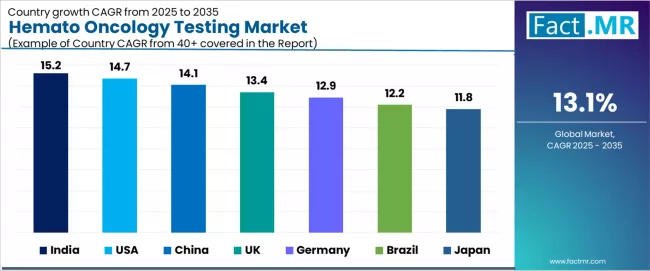
| Region/Country | 2025 to 2035 Growth | How to win | What to watch out |
|---|---|---|---|
| India | 15.2% | Focus on affordable testing portfolios | Infrastructure gaps; reimbursement challenges |
| USA | 14.7% | Lead with comprehensive profiling technologies | Pricing pressures; coverage limitations |
| China | 14.1% | Provide validated diagnostic solutions | Regulatory evolution; quality standards |
| UK | 13.4% | Offer NHS-compatible testing strategies | Budget constraints; centralized procurement |
| Germany | 12.9% | Maintain clinical utility positioning | Evidence requirements; conservative adoption |
| Brazil | 12.2% | Deliver cost-effective solutions | Economic volatility; access disparities |
| Japan | 11.8% | Push guideline-aligned programs | Aging demographics; reimbursement complexity |
India Drives Fastest Market Growth
India establishes fastest market growth through progressive cancer care expansion and comprehensive molecular diagnostic infrastructure development, positioning hemato oncology testing technologies as essential clinical solutions in tertiary care hospitals and emerging cancer centers.
The country's 15.2% growth rate reflects rising healthcare investment levels supporting diagnostic capacity expansion and growing precision medicine adoption that encourage the deployment of molecular testing products in diverse oncology settings. Growth concentrates in major metropolitan areas, including Mumbai, Delhi, and Bangalore, where cancer centers showcase increasing capacity for international diagnostic standard adoption that appeal to quality-focused providers demanding validated molecular profiling and clinical utility outcomes.
Indian oncology providers are developing standardized testing protocols that combine international diagnostic technologies with domestic laboratory partnerships, including reference testing expansion and molecular pathology capability growth. Distribution channels through healthcare distributors and diagnostic equipment suppliers expand market access, while pathologist training initiatives support adoption across diverse facility types and cancer care specialization levels.
USA Emerges as Precision Oncology Leader
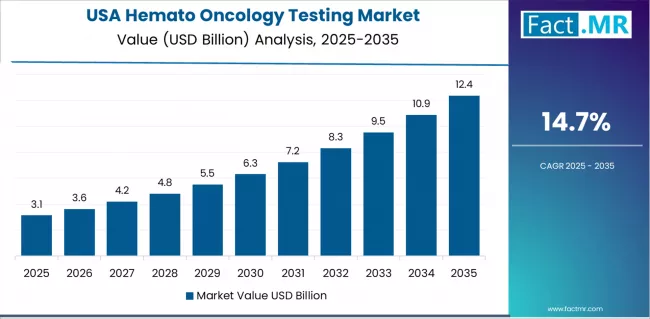
In major cancer centers across New York, Texas, and California regions, oncology facilities and academic medical centers are adopting advanced hemato oncology testing technologies as essential diagnostic tools for patient management operations, driven by comprehensive precision medicine integration and elevation of molecular diagnostic expectations that emphasize the importance of genomic profiling.
The market holds a 14.7% growth rate, supported by cancer center development and diagnostic infrastructure investment that promote testing adoption for treatment selection applications. American providers are favoring comprehensive NGS panels that provide extensive biomarker coverage and therapeutic target identification, particularly appealing in academic cancer centers where molecular precision and clinical trial eligibility represent critical clinical factors.
Market expansion benefits from substantial targeted therapy development and companion diagnostic establishment that enable widespread adoption of evidence-based molecular diagnostic methodologies for diverse hematological malignancy applications. Clinical adoption follows patterns established in precision oncology excellence, where genomic profiling advantages and treatment outcome documentation drive physician confidence and institutional protocol integration.
China Shows Expanding Diagnostic Capacity
China's developing oncology market demonstrates progressive hemato oncology testing adoption with documented precision medicine emphasis in molecular diagnostic implementation and cancer care protocol execution through expanding tertiary hospitals and established diagnostic service organizations.
The country maintains a 14.1% growth rate, leveraging growing healthcare infrastructure and oncology specialty development in urban cancer centers. Major metropolitan regions, including Beijing, Shanghai, and Guangzhou, showcase diagnostic-driven cancer care priorities where molecular testing technologies integrate with evolving oncology practices and comprehensive treatment approaches to optimize therapeutic decision-making and maintain clinical standard advancement under developing healthcare quality requirements.
Chinese oncology providers prioritize molecular diagnostic capabilities and clinical utility evidence in testing program development, creating demand for validated products with extensive analytical performance, including sensitivity documentation, specificity validation, and quality control systems. The market benefits from expanding cancer patient populations and precision medicine policy support that provide growth positioning opportunities and maintain alignment with Chinese healthcare modernization initiatives.
UK Demonstrates NHS Integration Leadership
The UK's established oncology market demonstrates comprehensive hemato oncology testing integration with documented clinical utility focus in diagnostic application and treatment protocol execution through specialized cancer centers and established molecular pathology networks.
The country maintains a 13.4% growth rate, leveraging NHS framework alignment with evidence-based medicine and quality-focused cancer care cultures in hematological malignancy treatment. Key cancer centers, including England and Scotland regions, showcase guideline-driven testing approaches where molecular diagnostic technologies integrate with established oncology pathways and systematic evaluation practices to optimize treatment selection readiness and maintain NHS standard compliance under rigorous clinical effectiveness requirements.
UK oncology providers prioritize comprehensive clinical utility documentation and cost-effectiveness evidence in diagnostic program implementation, creating demand for validated products with extensive outcomes data, including treatment impact studies, health economic analyses, and patient benefit documentation. The market benefits from established cancer network infrastructure and molecular diagnostic maturity that provide quality positioning opportunities and maintain alignment with NICE technology assessment expectations.
Germany Shows Clinical Excellence Integration
Germany's advanced oncology market demonstrates sophisticated hemato oncology testing integration with documented quality emphasis in diagnostic methodology and clinical protocol precision through specialized cancer centers and established molecular pathology laboratories. The country leverages rigorous quality system principles and evidence-based diagnostic approaches to maintain a 12.9% growth rate.
Premium cancer centers, including university hospitals in Bavaria, North Rhine-Westphalia, and Baden-Württemberg, showcase clinical validation priorities where molecular testing technologies integrate with established oncology cultures and thorough diagnostic practices to optimize treatment confidence and ensure appropriate molecular characterization.
German oncology providers prioritize comprehensive analytical validation and clinical utility documentation in testing implementation, creating demand for clinically validated products with extensive evidence characteristics, including prospective clinical trial data, comparative diagnostic studies, and comprehensive technical validation reports. The market benefits from established hematology-oncology expertise and diagnostic quality maturity that provide differentiation opportunities and compliance with strict German medical device regulations.
Brazil Demonstrates Emerging Market Potential
Brazil's developing oncology market demonstrates progressive hemato oncology testing adoption with documented precision medicine interest in diagnostic capacity and cancer care modernization through expanding cancer centers and specialized molecular diagnostic facilities. The country maintains a 12.2% growth rate, leveraging growing oncology infrastructure and molecular diagnostic awareness in major metropolitan areas.
Key cancer centers, including São Paulo, Rio de Janeiro, and Brasília regions, showcase quality-focused diagnostic priorities where molecular testing technologies integrate with developing precision oncology environments and comprehensive care approaches to optimize treatment capabilities and advance cancer care standards under evolving Brazilian healthcare frameworks.
Brazilian oncology providers prioritize diagnostic accessibility and clinical utility evidence in testing program development, creating demand for cost-effective products with demonstrated clinical value, including treatment guidance documentation, outcome improvement studies, and affordability positioning. The market benefits from expanding private healthcare sectors and public health oncology initiatives that provide market development opportunities and support alignment with Brazilian regulatory requirements.
Japan Shows Precision Medicine Maturity
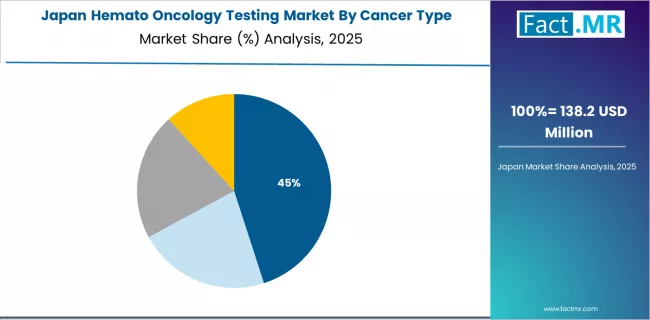
Japan's sophisticated oncology market demonstrates established hemato oncology testing integration with documented clinical guideline emphasis in diagnostic methodology and treatment protocol execution through comprehensive cancer centers and specialized hematology facilities. The country maintains an 11.8% growth rate, leveraging established oncology care heritage and rigorous regulatory oversight frameworks in molecular diagnostic applications.
Major cancer centers, including Tokyo, Osaka, and Nagoya regions, showcase traditional quality emphasis where molecular testing technologies integrate with established clinical practice guidelines and meticulous diagnostic practices to optimize cancer care assurance and maintain regulatory compliance under comprehensive health authority supervision.
Japanese oncology providers prioritize comprehensive regulatory approval and clinical guideline integration in diagnostic program implementation, creating demand for approved products with extensive documentation characteristics, including PMDA regulatory clearance, clinical practice guideline inclusion, and comprehensive validation reports. The market benefits from established hematology-oncology reputation and quality-focused care culture that provide premium positioning opportunities and comply with strict Japanese diagnostic regulations.
Europe Market Split by Country
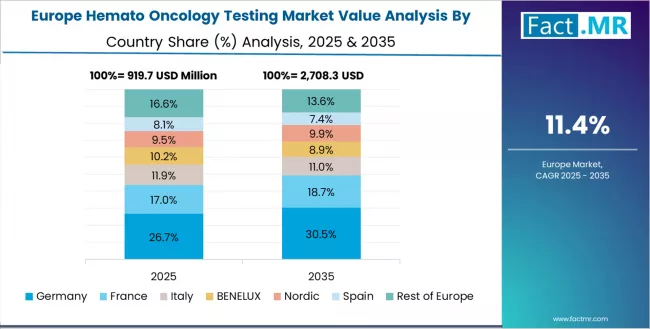
The European hemato oncology testing market is projected to grow from USD 1.10 billion in 2025 to USD 3.79 billion by 2035, representing 27.3% of the global market in 2025 and expanding to 27.4% by 2035. Germany is expected to maintain its leadership position with USD 0.29 billion in 2025, accounting for 26.8% of the European market, supported by its advanced oncology care infrastructure and established molecular diagnostic laboratory networks.
France follows with USD 0.21 billion, representing 18.9% of the European market in 2025, driven by comprehensive cancer center integration and academic medical center concentration. UK holds USD 0.19 billion with 17.3% market share through established NHS diagnostic pathways and cancer care network density.
Italy commands USD 0.16 billion representing 14.2% share, while Spain accounts for USD 0.13 billion or 11.6% in 2025. The rest of Europe region maintains USD 0.12 billion, representing 11.2% of the European market, attributed to increasing molecular diagnostic adoption in Nordic countries and emerging Eastern European cancer centers implementing precision oncology programs.
Competitive Landscape of the Hemato Oncology Testing Market
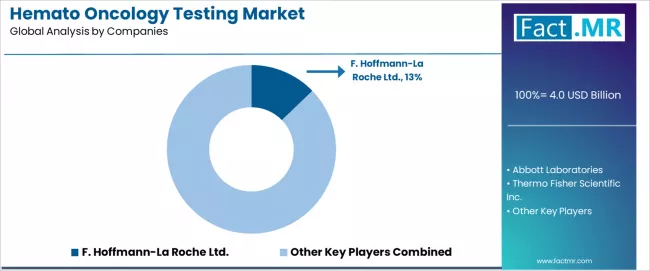
The hemato oncology testing market exhibits a moderately consolidated competitive structure with approximately 40-60 active players operating across global molecular diagnostic networks and regional laboratory service distribution portfolios. F. Hoffmann- La Roche Ltd. maintains market leadership at a 12.8% share, reflecting strong product portfolio positioning across diverse testing methodologies with sophisticated global commercialization strategies.
This competitive landscape demonstrates the maturation of molecular diagnostic technology, where established players leverage brand recognition advantages, extensive clinical validation evidence documentation, and oncology relationship programs to maintain dominant positions, while emerging next-generation sequencing developers and specialized molecular diagnostic companies create niche opportunities through comprehensive profiling offerings and clinical utility differentiation strategies.
Market leadership is maintained through several critical competitive advantages extending beyond manufacturing capabilities and product portfolios. Global distribution networks enable leading players to navigate diverse regulatory requirements and access varied oncology segments including hospital laboratories, reference testing organizations, and academic cancer centers.
Clinical support infrastructure and medical affairs program availability represent crucial differentiators in hemato oncology testing categories, where decades of clinical validation expertise, interpretation guidance protocols, and therapeutic decision-making frameworks create purchasing preference among oncology-focused laboratories.
Manufacturing efficiency in molecular diagnostic reagent production facilities, supply chain quality management, and analytical validation documentation separate major suppliers from smaller competitors, while comprehensive clinical evidence addressing treatment impact studies, outcome improvement data, and cost-effectiveness analyses strengthen market position and clinical confidence.
The market demonstrates emerging differentiation opportunities in liquid biopsy categories and comprehensive genomic profiling technologies, where traditional targeted molecular testing methodologies face competition from innovation-focused entrants offering comprehensive characterization advantages.
Significant competitive advantages persist in established PCR testing categories through extensive clinical utility portfolios and oncology relationship depth. Premium positioning strategies with comprehensive biomarker panel integration and clinical decision support capabilities command margin premiums through superior diagnostic information and treatment guidance integration.
Specialized testing portfolios combining multiple technology platforms with disease-specific protocols create comprehensive positioning that justifies higher price points beyond commodity molecular testing competition. Integrated diagnostic solution offerings emphasizing complementary testing compatibility, unified clinical interpretation support, and cross-technology training programs generate brand loyalty and testing menu preferences beyond transactional diagnostic purchases.
| Stakeholder | What they actually control | Typical strengths | Typical blind spots |
|---|---|---|---|
| Global diagnostic corporations | Comprehensive testing portfolios; global distribution; clinical evidence | Brand recognition; validation data; oncology relationships; service networks | Innovation speed; pricing flexibility; niche applications; regional customization |
| Specialized molecular diagnostic companies | Technology innovation; assay development; platform optimization | Product differentiation; technical sophistication; clinical training; laboratory loyalty | Market penetration; distribution infrastructure; reimbursement access; geographic coverage |
| NGS platform providers | Sequencing technology; bioinformatics systems; comprehensive profiling | Technology leadership; multiplex capabilities; data analytics; research visibility | Clinical adoption; cost barriers; turnaround time; reimbursement challenges |
| Reference laboratory networks | Service delivery; testing access; result interpretation; quality systems | Clinical expertise; operational scale; convenience positioning; comprehensive menus | Technology development; assay innovation; premium positioning; niche specialization |
| Academic medical centers | Clinical research; guideline development; training programs; evidence generation | Scientific credibility; clinical expertise; innovation influence; quality standards | Commercial scaling; cost efficiency; operational optimization; market awareness |
Key Players in the Hemato Oncology Testing Market
- F. Hoffmann-La Roche Ltd.
- Abbott Laboratories
- Thermo Fisher Scientific Inc.
- Illumina, Inc.
- Bio-Rad Laboratories, Inc.
- QIAGEN N.V.
- Cepheid (a Danaher company)
- Amoy Diagnostics Co., Ltd.
- EntroGen, Inc.
- Asuragen, Inc. (a Bio-Techne company)
- ArcherDX, Inc. (Invitae Corporation)
Scope of the Report
| Items | Values |
|---|---|
| Quantitative Units (2025) | USD 4.03 billion |
| Cancer Type | Lymphoma, Leukemia, Myeloproliferative Neoplasms (MPNs), Other Cancers |
| Product | Services, Assay Kits & Reagents |
| Technology | PCR (Real-time qPCR, Digital PCR), NGS, IHC, Cytogenetics, Others |
| End-Use | Hospitals, Academic & Research Institutes, Others |
| Regions Covered | North America, Europe, Asia Pacific, Latin America, Middle East & Africa |
| Countries Covered | USA, China, India, Germany, UK, Japan, Brazil, and 15+ additional countries |
| Key Companies Profiled | Roche, Abbott, Thermo Fisher, Illumina, Bio-Rad, Qiagen, Cepheid (Danaher), Amoy Diagnostics |
| Additional Attributes | Dollar sales by cancer type and technology categories, regional adoption trends across North America, Europe, and Asia Pacific, competitive landscape with established diagnostic corporations and specialized molecular testing companies, oncology provider preferences for PCR methodologies and comprehensive profiling, integration with hospital laboratories and reference testing organizations, innovations in liquid biopsy technologies and automated diagnostic platforms, and development of sophisticated molecular diagnostic systems with enhanced clinical utility profiles and comprehensive evidence documentation frameworks. |
Hemato Oncology Testing Market by Segments
-
Cancer Type:
- Lymphoma
- Leukemia
- Myeloproliferative Neoplasms (MPNs)
- Other Cancers
-
Product :
- Services
- Assay Kits & Reagents
-
Technology :
- PCR
- Real-time qPCR
- Digital PCR
- NGS
- IHC
- Cytogenetics
- Others
- PCR
-
End-Use :
- Hospitals
- Academic & Research Institutes
- Others
-
Region :
- North America
- USA
- Canada
- Mexico
- Europe
- Germany
- France
- UK
- Italy
- Spain
- Rest of Europe
- Asia Pacific
- India
- China
- Japan
- South Korea
- ASEAN
- Australia & New Zealand
- Rest of Asia Pacific
- Latin America
- Brazil
- Rest of Latin America
- Middle East & Africa
- GCC Countries
- South Africa
- Rest of Middle East & Africa
- North America
Table of Content
- Executive Summary
- Global Market Outlook
- Demand to side Trends
- Supply to side Trends
- Technology Roadmap Analysis
- Analysis and Recommendations
- Market Overview
- Market Coverage / Taxonomy
- Market Definition / Scope / Limitations
- Market Background
- Market Dynamics
- Drivers
- Restraints
- Opportunity
- Trends
- Scenario Forecast
- Demand in Optimistic Scenario
- Demand in Likely Scenario
- Demand in Conservative Scenario
- Opportunity Map Analysis
- Product Life Cycle Analysis
- Supply Chain Analysis
- Investment Feasibility Matrix
- Value Chain Analysis
- PESTLE and Porter’s Analysis
- Regulatory Landscape
- Regional Parent Market Outlook
- Production and Consumption Statistics
- Import and Export Statistics
- Market Dynamics
- Global Market Analysis 2020 to 2024 and Forecast, 2025 to 2035
- Historical Market Size Value (USD Million) Analysis, 2020 to 2024
- Current and Future Market Size Value (USD Million) Projections, 2025 to 2035
- Y to o to Y Growth Trend Analysis
- Absolute $ Opportunity Analysis
- Global Market Pricing Analysis 2020 to 2024 and Forecast 2025 to 2035
- Global Market Analysis 2020 to 2024 and Forecast 2025 to 2035, By Cancer Type
- Introduction / Key Findings
- Historical Market Size Value (USD Million) Analysis By Cancer Type, 2020 to 2024
- Current and Future Market Size Value (USD Million) Analysis and Forecast By Cancer Type, 2025 to 2035
- Lymphoma
- Leukemia
- Myeloproliferative Neoplasms (MPNs)
- Other Cancers
- Y to o to Y Growth Trend Analysis By Cancer Type, 2020 to 2024
- Absolute $ Opportunity Analysis By Cancer Type, 2025 to 2035
- Global Market Analysis 2020 to 2024 and Forecast 2025 to 2035, By Product
- Introduction / Key Findings
- Historical Market Size Value (USD Million) Analysis By Product, 2020 to 2024
- Current and Future Market Size Value (USD Million) Analysis and Forecast By Product, 2025 to 2035
- Services
- Assay Kits & Reagents
- Y to o to Y Growth Trend Analysis By Product, 2020 to 2024
- Absolute $ Opportunity Analysis By Product, 2025 to 2035
- Global Market Analysis 2020 to 2024 and Forecast 2025 to 2035, By Technology
- Introduction / Key Findings
- Historical Market Size Value (USD Million) Analysis By Technology, 2020 to 2024
- Current and Future Market Size Value (USD Million) Analysis and Forecast By Technology, 2025 to 2035
- PCR
- NGS
- IHC
- Cytogenetics
- Others
- Y to o to Y Growth Trend Analysis By Technology, 2020 to 2024
- Absolute $ Opportunity Analysis By Technology, 2025 to 2035
- Global Market Analysis 2020 to 2024 and Forecast 2025 to 2035, By End Use
- Introduction / Key Findings
- Historical Market Size Value (USD Million) Analysis By End Use, 2020 to 2024
- Current and Future Market Size Value (USD Million) Analysis and Forecast By End Use, 2025 to 2035
- Hospitals
- Academic & Research Institutes
- Others
- Y to o to Y Growth Trend Analysis By End Use, 2020 to 2024
- Absolute $ Opportunity Analysis By End Use, 2025 to 2035
- Global Market Analysis 2020 to 2024 and Forecast 2025 to 2035, By Region
- Introduction
- Historical Market Size Value (USD Million) Analysis By Region, 2020 to 2024
- Current Market Size Value (USD Million) Analysis and Forecast By Region, 2025 to 2035
- North America
- Latin America
- Western Europe
- Eastern Europe
- East Asia
- South Asia and Pacific
- Middle East & Africa
- Market Attractiveness Analysis By Region
- North America Market Analysis 2020 to 2024 and Forecast 2025 to 2035, By Country
- Historical Market Size Value (USD Million) Trend Analysis By Market Taxonomy, 2020 to 2024
- Market Size Value (USD Million) Forecast By Market Taxonomy, 2025 to 2035
- By Country
- USA
- Canada
- Mexico
- By Cancer Type
- By Product
- By Technology
- By End Use
- By Country
- Market Attractiveness Analysis
- By Country
- By Cancer Type
- By Product
- By Technology
- By End Use
- Key Takeaways
- Latin America Market Analysis 2020 to 2024 and Forecast 2025 to 2035, By Country
- Historical Market Size Value (USD Million) Trend Analysis By Market Taxonomy, 2020 to 2024
- Market Size Value (USD Million) Forecast By Market Taxonomy, 2025 to 2035
- By Country
- Brazil
- Chile
- Rest of Latin America
- By Cancer Type
- By Product
- By Technology
- By End Use
- By Country
- Market Attractiveness Analysis
- By Country
- By Cancer Type
- By Product
- By Technology
- By End Use
- Key Takeaways
- Western Europe Market Analysis 2020 to 2024 and Forecast 2025 to 2035, By Country
- Historical Market Size Value (USD Million) Trend Analysis By Market Taxonomy, 2020 to 2024
- Market Size Value (USD Million) Forecast By Market Taxonomy, 2025 to 2035
- By Country
- Germany
- UK
- Italy
- Spain
- France
- Nordic
- BENELUX
- Rest of Western Europe
- By Cancer Type
- By Product
- By Technology
- By End Use
- By Country
- Market Attractiveness Analysis
- By Country
- By Cancer Type
- By Product
- By Technology
- By End Use
- Key Takeaways
- Eastern Europe Market Analysis 2020 to 2024 and Forecast 2025 to 2035, By Country
- Historical Market Size Value (USD Million) Trend Analysis By Market Taxonomy, 2020 to 2024
- Market Size Value (USD Million) Forecast By Market Taxonomy, 2025 to 2035
- By Country
- Russia
- Poland
- Hungary
- Balkan & Baltic
- Rest of Eastern Europe
- By Cancer Type
- By Product
- By Technology
- By End Use
- By Country
- Market Attractiveness Analysis
- By Country
- By Cancer Type
- By Product
- By Technology
- By End Use
- Key Takeaways
- East Asia Market Analysis 2020 to 2024 and Forecast 2025 to 2035, By Country
- Historical Market Size Value (USD Million) Trend Analysis By Market Taxonomy, 2020 to 2024
- Market Size Value (USD Million) Forecast By Market Taxonomy, 2025 to 2035
- By Country
- China
- Japan
- South Korea
- By Cancer Type
- By Product
- By Technology
- By End Use
- By Country
- Market Attractiveness Analysis
- By Country
- By Cancer Type
- By Product
- By Technology
- By End Use
- Key Takeaways
- South Asia and Pacific Market Analysis 2020 to 2024 and Forecast 2025 to 2035, By Country
- Historical Market Size Value (USD Million) Trend Analysis By Market Taxonomy, 2020 to 2024
- Market Size Value (USD Million) Forecast By Market Taxonomy, 2025 to 2035
- By Country
- India
- ASEAN
- Australia & New Zealand
- Rest of South Asia and Pacific
- By Cancer Type
- By Product
- By Technology
- By End Use
- By Country
- Market Attractiveness Analysis
- By Country
- By Cancer Type
- By Product
- By Technology
- By End Use
- Key Takeaways
- Middle East & Africa Market Analysis 2020 to 2024 and Forecast 2025 to 2035, By Country
- Historical Market Size Value (USD Million) Trend Analysis By Market Taxonomy, 2020 to 2024
- Market Size Value (USD Million) Forecast By Market Taxonomy, 2025 to 2035
- By Country
- Kingdom of Saudi Arabia
- Other GCC Countries
- Turkiye
- South Africa
- Other African Union
- Rest of Middle East & Africa
- By Cancer Type
- By Product
- By Technology
- By End Use
- By Country
- Market Attractiveness Analysis
- By Country
- By Cancer Type
- By Product
- By Technology
- By End Use
- Key Takeaways
- Key Countries Market Analysis
- USA
- Pricing Analysis
- Market Share Analysis, 2024
- By Cancer Type
- By Product
- By Technology
- By End Use
- Canada
- Pricing Analysis
- Market Share Analysis, 2024
- By Cancer Type
- By Product
- By Technology
- By End Use
- Mexico
- Pricing Analysis
- Market Share Analysis, 2024
- By Cancer Type
- By Product
- By Technology
- By End Use
- Brazil
- Pricing Analysis
- Market Share Analysis, 2024
- By Cancer Type
- By Product
- By Technology
- By End Use
- Chile
- Pricing Analysis
- Market Share Analysis, 2024
- By Cancer Type
- By Product
- By Technology
- By End Use
- Germany
- Pricing Analysis
- Market Share Analysis, 2024
- By Cancer Type
- By Product
- By Technology
- By End Use
- UK
- Pricing Analysis
- Market Share Analysis, 2024
- By Cancer Type
- By Product
- By Technology
- By End Use
- Italy
- Pricing Analysis
- Market Share Analysis, 2024
- By Cancer Type
- By Product
- By Technology
- By End Use
- Spain
- Pricing Analysis
- Market Share Analysis, 2024
- By Cancer Type
- By Product
- By Technology
- By End Use
- France
- Pricing Analysis
- Market Share Analysis, 2024
- By Cancer Type
- By Product
- By Technology
- By End Use
- India
- Pricing Analysis
- Market Share Analysis, 2024
- By Cancer Type
- By Product
- By Technology
- By End Use
- ASEAN
- Pricing Analysis
- Market Share Analysis, 2024
- By Cancer Type
- By Product
- By Technology
- By End Use
- Australia & New Zealand
- Pricing Analysis
- Market Share Analysis, 2024
- By Cancer Type
- By Product
- By Technology
- By End Use
- China
- Pricing Analysis
- Market Share Analysis, 2024
- By Cancer Type
- By Product
- By Technology
- By End Use
- Japan
- Pricing Analysis
- Market Share Analysis, 2024
- By Cancer Type
- By Product
- By Technology
- By End Use
- South Korea
- Pricing Analysis
- Market Share Analysis, 2024
- By Cancer Type
- By Product
- By Technology
- By End Use
- Russia
- Pricing Analysis
- Market Share Analysis, 2024
- By Cancer Type
- By Product
- By Technology
- By End Use
- Poland
- Pricing Analysis
- Market Share Analysis, 2024
- By Cancer Type
- By Product
- By Technology
- By End Use
- Hungary
- Pricing Analysis
- Market Share Analysis, 2024
- By Cancer Type
- By Product
- By Technology
- By End Use
- Kingdom of Saudi Arabia
- Pricing Analysis
- Market Share Analysis, 2024
- By Cancer Type
- By Product
- By Technology
- By End Use
- Turkiye
- Pricing Analysis
- Market Share Analysis, 2024
- By Cancer Type
- By Product
- By Technology
- By End Use
- South Africa
- Pricing Analysis
- Market Share Analysis, 2024
- By Cancer Type
- By Product
- By Technology
- By End Use
- USA
- Market Structure Analysis
- Competition Dashboard
- Competition Benchmarking
- Market Share Analysis of Top Players
- By Regional
- By Cancer Type
- By Product
- By Technology
- By End Use
- Competition Analysis
- Competition Deep Dive
- F. Hoffmann-La Roche Ltd.
- Overview
- Product Portfolio
- Profitability by Market Segments (Product/Age /Sales Channel/Region)
- Sales Footprint
- Strategy Overview
- Marketing Strategy
- Product Strategy
- Channel Strategy
- Abbott Laboratories
- Thermo Fisher Scientific Inc.
- Illumina, Inc.
- Bio-Rad Laboratories, Inc.
- QIAGEN N.V.
- Cepheid (a Danaher company)
- Amoy Diagnostics Co., Ltd.
- EntroGen, Inc.
- Asuragen, Inc. (a Bio-Techne company)
- ArcherDX, Inc. (Invitae Corporation)
- F. Hoffmann-La Roche Ltd.
- Competition Deep Dive
- Assumptions & Acronyms Used
- Research Methodology
List Of Table
- Table 1: Global Market Value (USD Million) Forecast by Region, 2020 to 2035
- Table 2: Global Market Value (USD Million) Forecast by Cancer Type, 2020 to 2035
- Table 3: Global Market Value (USD Million) Forecast by Product, 2020 to 2035
- Table 4: Global Market Value (USD Million) Forecast by Technology, 2020 to 2035
- Table 5: Global Market Value (USD Million) Forecast by End Use, 2020 to 2035
- Table 6: North America Market Value (USD Million) Forecast by Country, 2020 to 2035
- Table 7: North America Market Value (USD Million) Forecast by Cancer Type, 2020 to 2035
- Table 8: North America Market Value (USD Million) Forecast by Product, 2020 to 2035
- Table 9: North America Market Value (USD Million) Forecast by Technology, 2020 to 2035
- Table 10: North America Market Value (USD Million) Forecast by End Use, 2020 to 2035
- Table 11: Latin America Market Value (USD Million) Forecast by Country, 2020 to 2035
- Table 12: Latin America Market Value (USD Million) Forecast by Cancer Type, 2020 to 2035
- Table 13: Latin America Market Value (USD Million) Forecast by Product, 2020 to 2035
- Table 14: Latin America Market Value (USD Million) Forecast by Technology, 2020 to 2035
- Table 15: Latin America Market Value (USD Million) Forecast by End Use, 2020 to 2035
- Table 16: Western Europe Market Value (USD Million) Forecast by Country, 2020 to 2035
- Table 17: Western Europe Market Value (USD Million) Forecast by Cancer Type, 2020 to 2035
- Table 18: Western Europe Market Value (USD Million) Forecast by Product, 2020 to 2035
- Table 19: Western Europe Market Value (USD Million) Forecast by Technology, 2020 to 2035
- Table 20: Western Europe Market Value (USD Million) Forecast by End Use, 2020 to 2035
- Table 21: Eastern Europe Market Value (USD Million) Forecast by Country, 2020 to 2035
- Table 22: Eastern Europe Market Value (USD Million) Forecast by Cancer Type, 2020 to 2035
- Table 23: Eastern Europe Market Value (USD Million) Forecast by Product, 2020 to 2035
- Table 24: Eastern Europe Market Value (USD Million) Forecast by Technology, 2020 to 2035
- Table 25: Eastern Europe Market Value (USD Million) Forecast by End Use, 2020 to 2035
- Table 26: East Asia Market Value (USD Million) Forecast by Country, 2020 to 2035
- Table 27: East Asia Market Value (USD Million) Forecast by Cancer Type, 2020 to 2035
- Table 28: East Asia Market Value (USD Million) Forecast by Product, 2020 to 2035
- Table 29: East Asia Market Value (USD Million) Forecast by Technology, 2020 to 2035
- Table 30: East Asia Market Value (USD Million) Forecast by End Use, 2020 to 2035
- Table 31: South Asia and Pacific Market Value (USD Million) Forecast by Country, 2020 to 2035
- Table 32: South Asia and Pacific Market Value (USD Million) Forecast by Cancer Type, 2020 to 2035
- Table 33: South Asia and Pacific Market Value (USD Million) Forecast by Product, 2020 to 2035
- Table 34: South Asia and Pacific Market Value (USD Million) Forecast by Technology, 2020 to 2035
- Table 35: South Asia and Pacific Market Value (USD Million) Forecast by End Use, 2020 to 2035
- Table 36: Middle East & Africa Market Value (USD Million) Forecast by Country, 2020 to 2035
- Table 37: Middle East & Africa Market Value (USD Million) Forecast by Cancer Type, 2020 to 2035
- Table 38: Middle East & Africa Market Value (USD Million) Forecast by Product, 2020 to 2035
- Table 39: Middle East & Africa Market Value (USD Million) Forecast by Technology, 2020 to 2035
- Table 40: Middle East & Africa Market Value (USD Million) Forecast by End Use, 2020 to 2035
List Of Figures
- Figure 1: Global Market Pricing Analysis
- Figure 2: Global Market Value (USD Million) Forecast 2020-2035
- Figure 3: Global Market Value Share and BPS Analysis by Cancer Type, 2025 and 2035
- Figure 4: Global Market Y to o to Y Growth Comparison by Cancer Type, 2025 to 2035
- Figure 5: Global Market Attractiveness Analysis by Cancer Type
- Figure 6: Global Market Value Share and BPS Analysis by Product, 2025 and 2035
- Figure 7: Global Market Y to o to Y Growth Comparison by Product, 2025 to 2035
- Figure 8: Global Market Attractiveness Analysis by Product
- Figure 9: Global Market Value Share and BPS Analysis by Technology, 2025 and 2035
- Figure 10: Global Market Y to o to Y Growth Comparison by Technology, 2025 to 2035
- Figure 11: Global Market Attractiveness Analysis by Technology
- Figure 12: Global Market Value Share and BPS Analysis by End Use, 2025 and 2035
- Figure 13: Global Market Y to o to Y Growth Comparison by End Use, 2025 to 2035
- Figure 14: Global Market Attractiveness Analysis by End Use
- Figure 15: Global Market Value (USD Million) Share and BPS Analysis by Region, 2025 and 2035
- Figure 16: Global Market Y to o to Y Growth Comparison by Region, 2025 to 2035
- Figure 17: Global Market Attractiveness Analysis by Region
- Figure 18: North America Market Incremental Dollar Opportunity, 2025 to 2035
- Figure 19: Latin America Market Incremental Dollar Opportunity, 2025 to 2035
- Figure 20: Western Europe Market Incremental Dollar Opportunity, 2025 to 2035
- Figure 21: Eastern Europe Market Incremental Dollar Opportunity, 2025 to 2035
- Figure 22: East Asia Market Incremental Dollar Opportunity, 2025 to 2035
- Figure 23: South Asia and Pacific Market Incremental Dollar Opportunity, 2025 to 2035
- Figure 24: Middle East & Africa Market Incremental Dollar Opportunity, 2025 to 2035
- Figure 25: North America Market Value Share and BPS Analysis by Country, 2025 and 2035
- Figure 26: North America Market Value Share and BPS Analysis by Cancer Type, 2025 and 2035
- Figure 27: North America Market Y to o to Y Growth Comparison by Cancer Type, 2025 to 2035
- Figure 28: North America Market Attractiveness Analysis by Cancer Type
- Figure 29: North America Market Value Share and BPS Analysis by Product, 2025 and 2035
- Figure 30: North America Market Y to o to Y Growth Comparison by Product, 2025 to 2035
- Figure 31: North America Market Attractiveness Analysis by Product
- Figure 32: North America Market Value Share and BPS Analysis by Technology, 2025 and 2035
- Figure 33: North America Market Y to o to Y Growth Comparison by Technology, 2025 to 2035
- Figure 34: North America Market Attractiveness Analysis by Technology
- Figure 35: North America Market Value Share and BPS Analysis by End Use, 2025 and 2035
- Figure 36: North America Market Y to o to Y Growth Comparison by End Use, 2025 to 2035
- Figure 37: North America Market Attractiveness Analysis by End Use
- Figure 38: Latin America Market Value Share and BPS Analysis by Country, 2025 and 2035
- Figure 39: Latin America Market Value Share and BPS Analysis by Cancer Type, 2025 and 2035
- Figure 40: Latin America Market Y to o to Y Growth Comparison by Cancer Type, 2025 to 2035
- Figure 41: Latin America Market Attractiveness Analysis by Cancer Type
- Figure 42: Latin America Market Value Share and BPS Analysis by Product, 2025 and 2035
- Figure 43: Latin America Market Y to o to Y Growth Comparison by Product, 2025 to 2035
- Figure 44: Latin America Market Attractiveness Analysis by Product
- Figure 45: Latin America Market Value Share and BPS Analysis by Technology, 2025 and 2035
- Figure 46: Latin America Market Y to o to Y Growth Comparison by Technology, 2025 to 2035
- Figure 47: Latin America Market Attractiveness Analysis by Technology
- Figure 48: Latin America Market Value Share and BPS Analysis by End Use, 2025 and 2035
- Figure 49: Latin America Market Y to o to Y Growth Comparison by End Use, 2025 to 2035
- Figure 50: Latin America Market Attractiveness Analysis by End Use
- Figure 51: Western Europe Market Value Share and BPS Analysis by Country, 2025 and 2035
- Figure 52: Western Europe Market Value Share and BPS Analysis by Cancer Type, 2025 and 2035
- Figure 53: Western Europe Market Y to o to Y Growth Comparison by Cancer Type, 2025 to 2035
- Figure 54: Western Europe Market Attractiveness Analysis by Cancer Type
- Figure 55: Western Europe Market Value Share and BPS Analysis by Product, 2025 and 2035
- Figure 56: Western Europe Market Y to o to Y Growth Comparison by Product, 2025 to 2035
- Figure 57: Western Europe Market Attractiveness Analysis by Product
- Figure 58: Western Europe Market Value Share and BPS Analysis by Technology, 2025 and 2035
- Figure 59: Western Europe Market Y to o to Y Growth Comparison by Technology, 2025 to 2035
- Figure 60: Western Europe Market Attractiveness Analysis by Technology
- Figure 61: Western Europe Market Value Share and BPS Analysis by End Use, 2025 and 2035
- Figure 62: Western Europe Market Y to o to Y Growth Comparison by End Use, 2025 to 2035
- Figure 63: Western Europe Market Attractiveness Analysis by End Use
- Figure 64: Eastern Europe Market Value Share and BPS Analysis by Country, 2025 and 2035
- Figure 65: Eastern Europe Market Value Share and BPS Analysis by Cancer Type, 2025 and 2035
- Figure 66: Eastern Europe Market Y to o to Y Growth Comparison by Cancer Type, 2025 to 2035
- Figure 67: Eastern Europe Market Attractiveness Analysis by Cancer Type
- Figure 68: Eastern Europe Market Value Share and BPS Analysis by Product, 2025 and 2035
- Figure 69: Eastern Europe Market Y to o to Y Growth Comparison by Product, 2025 to 2035
- Figure 70: Eastern Europe Market Attractiveness Analysis by Product
- Figure 71: Eastern Europe Market Value Share and BPS Analysis by Technology, 2025 and 2035
- Figure 72: Eastern Europe Market Y to o to Y Growth Comparison by Technology, 2025 to 2035
- Figure 73: Eastern Europe Market Attractiveness Analysis by Technology
- Figure 74: Eastern Europe Market Value Share and BPS Analysis by End Use, 2025 and 2035
- Figure 75: Eastern Europe Market Y to o to Y Growth Comparison by End Use, 2025 to 2035
- Figure 76: Eastern Europe Market Attractiveness Analysis by End Use
- Figure 77: East Asia Market Value Share and BPS Analysis by Country, 2025 and 2035
- Figure 78: East Asia Market Value Share and BPS Analysis by Cancer Type, 2025 and 2035
- Figure 79: East Asia Market Y to o to Y Growth Comparison by Cancer Type, 2025 to 2035
- Figure 80: East Asia Market Attractiveness Analysis by Cancer Type
- Figure 81: East Asia Market Value Share and BPS Analysis by Product, 2025 and 2035
- Figure 82: East Asia Market Y to o to Y Growth Comparison by Product, 2025 to 2035
- Figure 83: East Asia Market Attractiveness Analysis by Product
- Figure 84: East Asia Market Value Share and BPS Analysis by Technology, 2025 and 2035
- Figure 85: East Asia Market Y to o to Y Growth Comparison by Technology, 2025 to 2035
- Figure 86: East Asia Market Attractiveness Analysis by Technology
- Figure 87: East Asia Market Value Share and BPS Analysis by End Use, 2025 and 2035
- Figure 88: East Asia Market Y to o to Y Growth Comparison by End Use, 2025 to 2035
- Figure 89: East Asia Market Attractiveness Analysis by End Use
- Figure 90: South Asia and Pacific Market Value Share and BPS Analysis by Country, 2025 and 2035
- Figure 91: South Asia and Pacific Market Value Share and BPS Analysis by Cancer Type, 2025 and 2035
- Figure 92: South Asia and Pacific Market Y to o to Y Growth Comparison by Cancer Type, 2025 to 2035
- Figure 93: South Asia and Pacific Market Attractiveness Analysis by Cancer Type
- Figure 94: South Asia and Pacific Market Value Share and BPS Analysis by Product, 2025 and 2035
- Figure 95: South Asia and Pacific Market Y to o to Y Growth Comparison by Product, 2025 to 2035
- Figure 96: South Asia and Pacific Market Attractiveness Analysis by Product
- Figure 97: South Asia and Pacific Market Value Share and BPS Analysis by Technology, 2025 and 2035
- Figure 98: South Asia and Pacific Market Y to o to Y Growth Comparison by Technology, 2025 to 2035
- Figure 99: South Asia and Pacific Market Attractiveness Analysis by Technology
- Figure 100: South Asia and Pacific Market Value Share and BPS Analysis by End Use, 2025 and 2035
- Figure 101: South Asia and Pacific Market Y to o to Y Growth Comparison by End Use, 2025 to 2035
- Figure 102: South Asia and Pacific Market Attractiveness Analysis by End Use
- Figure 103: Middle East & Africa Market Value Share and BPS Analysis by Country, 2025 and 2035
- Figure 104: Middle East & Africa Market Value Share and BPS Analysis by Cancer Type, 2025 and 2035
- Figure 105: Middle East & Africa Market Y to o to Y Growth Comparison by Cancer Type, 2025 to 2035
- Figure 106: Middle East & Africa Market Attractiveness Analysis by Cancer Type
- Figure 107: Middle East & Africa Market Value Share and BPS Analysis by Product, 2025 and 2035
- Figure 108: Middle East & Africa Market Y to o to Y Growth Comparison by Product, 2025 to 2035
- Figure 109: Middle East & Africa Market Attractiveness Analysis by Product
- Figure 110: Middle East & Africa Market Value Share and BPS Analysis by Technology, 2025 and 2035
- Figure 111: Middle East & Africa Market Y to o to Y Growth Comparison by Technology, 2025 to 2035
- Figure 112: Middle East & Africa Market Attractiveness Analysis by Technology
- Figure 113: Middle East & Africa Market Value Share and BPS Analysis by End Use, 2025 and 2035
- Figure 114: Middle East & Africa Market Y to o to Y Growth Comparison by End Use, 2025 to 2035
- Figure 115: Middle East & Africa Market Attractiveness Analysis by End Use
- Figure 116: Global Market - Tier Structure Analysis
- Figure 117: Global Market - Company Share Analysis
- FAQs -
How big is the hemato oncology testing market in 2025?
The global hemato oncology testing market is estimated to be valued at USD 4.0 billion in 2025.
What will be the size of hemato oncology testing market in 2035?
The market size for the hemato oncology testing market is projected to reach USD 13.9 billion by 2035.
How much will be the hemato oncology testing market growth between 2025 and 2035?
The hemato oncology testing market is expected to grow at a 13.1% CAGR between 2025 and 2035.
What are the key product types in the hemato oncology testing market?
The key product types in hemato oncology testing market are lymphoma, leukemia, myeloproliferative neoplasms (mpns) and other cancers.
Which product segment to contribute significant share in the hemato oncology testing market in 2025?
In terms of product, services segment to command 58.7% share in the hemato oncology testing market in 2025.